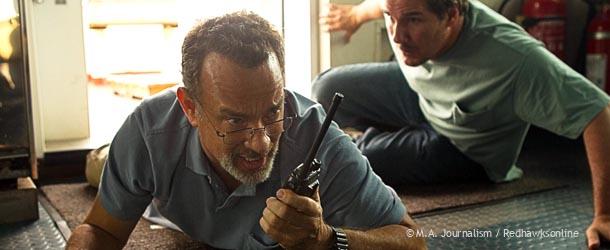Stepping inside the pirates’ shoes
It’s a true story of two captains and their crew just trying to do their jobs. For one that means carrying cargo to ports on the African coast, but for the other that means getting money through piracy. As both point of views are shown, they soon mesh into one story. Captain Phillips portrays the true story of four Somali crewmen who attack an American ship, the Maersk Alabama, and take control of an unarmed ship. Throughout the film nominated for Best Picture, two captains struggle to finish their duties to please their bosses.
After hijacking the ship, the Somali pirates, with Muse (Barkhad Abdi) as their leader, demand money and the location of the rest of the hiding crew. Communication between the Somalis and Americans consist of the Somalis yelling what they want while Captain Phillips (Tom Hanks) tries to calm them down. The pirates switch back and forth from Somali to English, which makes the film realistic and mimics the confusion that the Americans must have felt. With distractions gone wrong, the audience finds Captain Phillips in the lifeboat with Muse and his crew after the Americans think they got rid of the Somalis.
For the next day and a half, the four Somali pirates travel in this lifeboat with the hope they will make it back to Somalia with Captain Phillips. The Somalis try to hold Phillips hostage to get the pay they need to satisfy their boss but soon enough the U.S. Navy gets involved. The mood changes. The pirates have two choices. They could peacefully give Phillips up and go home empty-handed and most likely get killed. Or they could fight to the death and get killed by the Navy. Their fate is obvious but the choice is theirs.
This movie blew my expectations out of the water. A movie showing the point-of-view of the pirates made their motives more understandable. I found myself switching who I thought was the protagonist from time to time. The movie made me step inside the pirate’s shoes and didn’t sugarcoat the story. In the end, I did realize what the pirates were doing was wrong and having them win this fight would have caused major problems; the world would see the U.S. as weak and these pirates would have gone out and done it again. But the pirates were only between the ages of 17 and 19 and made the audience sympathize with them. Just children. The fear they instilled in Phillips and his crew was astonishing and so was the acting.
Abdi, portraying the Somali captain, was tough but innocent as well. The trust he had in the U.S. to tell him the truth made me cry in the end. I wanted the U.S. to tell the truth for his sake because he opened my eyes to a different world. His nomination for Best Supporting Actor was well deserved. I found Tom Hanks’ character unlikable which seemed to be the goal. At the end it was as if the Navy took Hanks and swept him off his feet, leaving the pirates with few options.
Living in U.S., many of us forget the world isn’t fair. Life isn’t fair. Captain Phillips didn’t understand that the pirates didn’t have the same options he did.
“There’s got to be something other than being a fisherman and kidnapping people” said Phillips. Muse looks at Captain Phillips in a daze and uses his nickname. “Maybe in America, Irish,” said Muse. “Maybe in America.”
With fear in Muse’s eyes and sadness across his face, the audience sees the confusion he feels.
“It was supposed to be easy. I take ship ransom… nobody get hurt,” said Muse. It wasn’t about killing. It wasn’t about having power. It was about doing what they were told, it was about making the best of the life they had.
For the great script, heart-racing scenes, and outstanding acting and thought-provoking message. This movie is well-worth seeing.

